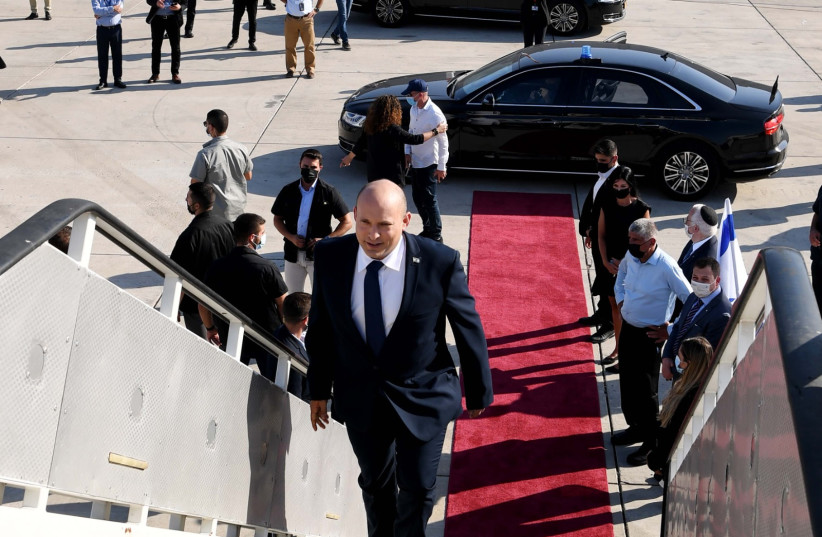With poll numbers sagging, the coronavirus surging and the shadow of Benjamin Netanyahu smothering, Prime Minister Naftali Bennett’s current visit to the US could not come at a more opportune moment for him.
Some two and a half months into his expected two-year tenure, Bennett needs to prove to a still very skeptical nation that he is prime-ministerial material, that he deserves to be prime minister and is up to the job and that he is not just sitting in the prime minister’s chair because of a fluke.
A recent poll indicates, however, that Bennett desperately needs the public to see him as a man cut from leadership cloth. A poll aired Friday on Channel 12 showed that were elections held today, his Yamina Party, which won a meager seven seats last time around, would win only six this time. Netanyahu’s Likud would grow from 30 to 32 seats, and Foreign Minister Yair Lapid’s Yesh Atid would go from 17 to 20.
In a finding further damning for Bennett, when respondents were asked who is more suited to be prime minister, him or Netanyahu, some 45% gave the nod to Netanyahu, while only 25% said Bennett was the better candidate for the job.
Bennett’s own ministers, Lapid and Defense Minister Benny Gantz, each scored higher on this question than he did when pitted against Netanyahu, though neither one of them overtook the former premier either.
Bennett’s unfortunate conversation Sunday night with Yossi Shmueli, the father of the border policeman critically wounded at the Gaza border on Saturday, reinforced a perception among part of the public that Bennett was in over his head and that while he might be suited to fighting the coronavirus – though some are now questioning even that – he doesn’t have what it takes to be prime minister.
During that conversation, Bennett got the father’s name mixed up with that of his wounded son, Bar-el, and didn’t know which hospital he was in or what his condition was, details a prime minister should know before making this type of call.
This is why Bennett’s trip to Washington, even if he is on the ground there for less than 48 hours, is so important for him. There is little that makes a prime minister look more prime-ministerial than sitting in the Oval Office for a meeting with the US president as cameras click and reporters shout out questions.

Bennett also realizes this, which is one reason to explain his office’s announcement on Tuesday that within three weeks of coming back from Washington, he will head back to the US to address the annual UN General Assembly in New York.
By rights, Lapid could go to the UN to address the meeting. But that would be a political mistake for Bennett since this is the quintessential stage for looking like a national leader – not necessarily to the rest of the world, which is unlikely to pay much attention to his speech, but rather to Israelis back home. Seeing Bennett in these settings is important to raise his stature in the eyes of the public.
Bennett is not the first prime minister to look forward to these trips. Netanyahu loved them, but for a somewhat different reason.
Netanyahu did not need these trips to make him look prime-ministerial; after 12 consecutive years in office, and 15 if his first term is tallied in, the world was used to him in that role.
Rather, Netanyahu relished these trips because – at least in the last couple of years – they gave him temporary respite from the scandals that continuously whirled around him and his family at home. These trips enabled him to change the conversation, if only briefly.
Just before a trip he took to Latin America in 2017, a draft indictment was drawn up against his wife for allegedly misusing funds. Four months later, as Netanyahu was on his way to India in 2018, the questions he was asked on the tarmac were not about Indo-Israeli ties but why his son Yair, whose drunken conversations with friends in 2015 were made public days earlier, was not on the trip.
And in March 2019, during a trip to Washington, it was reported that his former spokesman and close aide Nir Hefetz was going to turn state’s witness against him.
Netanyahu liked these trips because for a few brief days he did not have to focus on those problems but could bask in the light of being on the world’s stage and doing what he did best: engage in high diplomacy, give speeches and present Israel’s case to the world.
Bennett is not dogged by domestic scandals. His trip to Washington is not a way to find temporary relief from what is going on in Israel. He is not trying to escape anything at home.
Rather, Bennett’s trip to Washington – the black limousines, the red carpets, the joint press conference with Biden – is a way for him to raise his stature, build up his image in the eyes of his countrymen and make him look like the nation’s leader.
It took years for Netanyahu to gain the stature he enjoyed as a statesman, so it is unrealistic to expect Bennett to gain a similar status overnight. But if this trip goes smoothly, if Bennett does not make any extraordinary gaffes, it could serve as a significant step in that direction.
Bennett’s image as prime minister needs burnishing, and this visit to Washington could do just that. Trappings matter.
